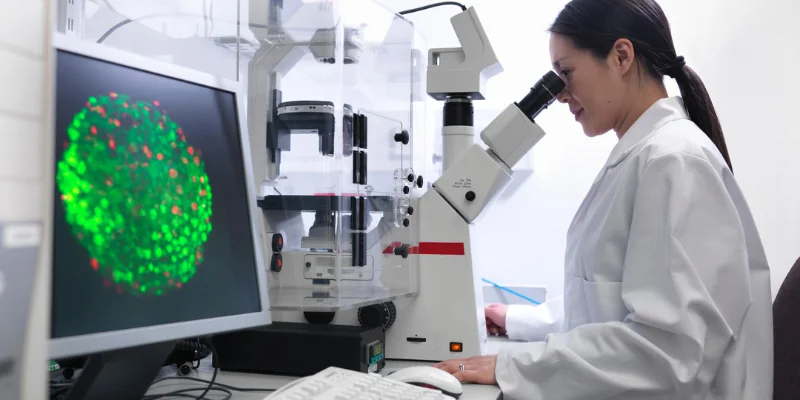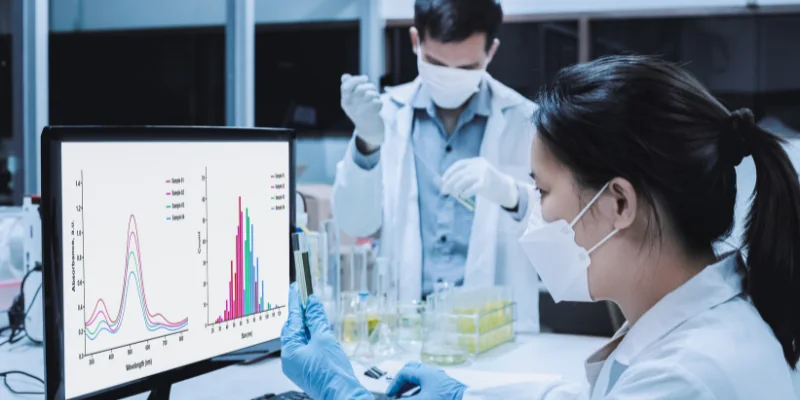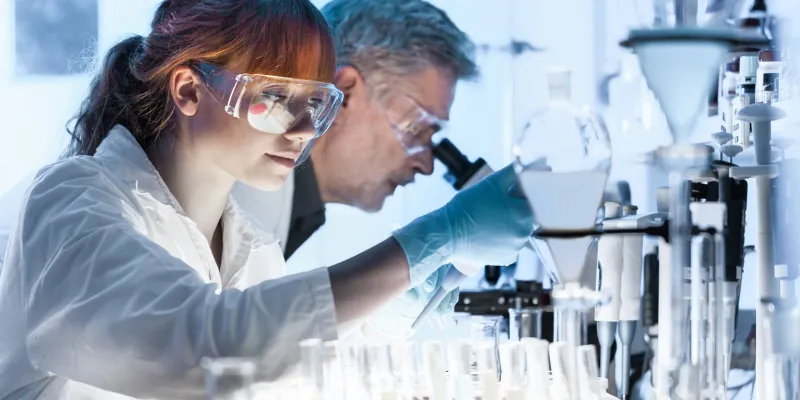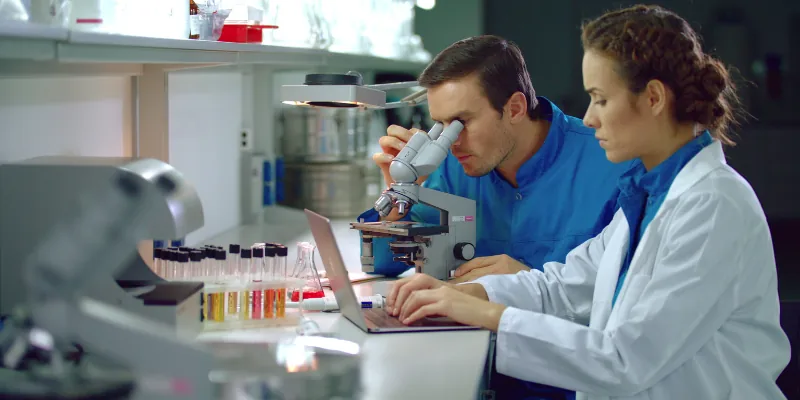Advantages of Computer in Scientific Research for Accuracy
Published: 16 Feb 2025
Computers have transformed scientific research in ways we never imagined. Today, researchers can analyze massive datasets in seconds, run complex simulations, and collaborate with experts worldwide. From predicting climate change to discovering new medicines, computers play a crucial role in speeding up discoveries. Let’s explore the key advantages of computer in scientific research and how they help scientists achieve breakthroughs.
Faster Data Processing and Analysis
Computers help scientists analyze huge amounts of data in a fraction of the time it would take manually. This allows researchers to complete tasks faster and make decisions more quickly. With advanced data-processing capabilities, scientists can focus on more important aspects of their research instead of spending time on calculations. Here are the main points:
- Computers can process massive data sets in seconds, reducing the time needed for analysis.
- Complex equations and formulas are solved instantly without human error.
- Scientists can run multiple tests or simulations in parallel, saving time.
- High-speed computing helps researchers analyze data from experiments, such as in genetics or climate studies.
- Faster data analysis results in quicker scientific discoveries and solutions to problems.
- The ability to process data quickly allows researchers to test theories more efficiently.
- Supercomputers handle extremely large datasets, like those in astronomy or particle physics.
- With computers, scientists can generate and analyze large amounts of data from experiments in real-time.
- The speed of data analysis also speeds up the publication of research findings.
- Without computers, scientists would be stuck using outdated, slower methods that delay progress.

High Accuracy and Reduced Human Error
Computers follow strict instructions and help reduce human errors, which is critical in scientific research. Human mistakes, even small ones, can lead to incorrect results, wasting time and resources. Computers ensure that calculations and data analysis are done precisely, making research more reliable. Key benefits include:
- Computers perform calculations with high accuracy, reducing the chance of mistakes.
- In fields like medical research, even tiny errors can have serious consequences, which computers help prevent.
- Computer algorithms ensure that data is analyzed using consistent and exact methods.
- With automated checks and balances, results are more trustworthy.
- AI tools can help spot errors that humans might miss, further improving accuracy.
- Software designed for research ensures that data is interpreted correctly.
- This reduces the risk of false conclusions or faulty research.
- Computers eliminate the need for repetitive manual calculations, cutting down on human fatigue and mistakes.
- High accuracy means better results, helping researchers move forward in their work.
- Scientists can have greater confidence in their findings when computers handle calculations.

Advanced Simulations and Modeling
Computers allow scientists to create detailed models and simulations of real-world phenomena. This means they can test ideas and theories without the need for expensive or dangerous physical experiments. These simulations help researchers understand complex processes, from climate change to human diseases. Benefits include:
- Scientists use computer models to simulate things like weather patterns, biological systems, or physics experiments.
- Modeling helps predict how systems behave over time, saving researchers from conducting dangerous or costly real-world tests.
- Simulations provide a controlled environment to test ideas and theories.
- Virtual experiments can be run multiple times without additional cost or risk.
- In medicine, computer modeling can predict how a drug will interact with the human body.
- Engineers use computer simulations to test new designs before building prototypes.
- Simulations are especially valuable in dangerous fields, like space research, where real experiments may be too risky.
- AI can be used to enhance simulations, making them more accurate and predictive.
- They help researchers visualize complex ideas and communicate their findings more effectively.
- Without computers, scientists would have to rely on traditional, slower methods that limit their potential.
Easy Data Storage and Organization
Computers provide easy and secure ways to store large amounts of research data. Instead of using paper records or physical storage, scientists can organize everything digitally, making it much easier to access and share. With the help of cloud technology, data can be stored and retrieved from anywhere. Key advantages:
- Digital storage allows researchers to organize, retrieve, and analyze data quickly.
- Cloud storage offers secure access to data from anywhere in the world.
- Researchers no longer need to waste time searching through piles of physical notes and papers.
- Backups and encryption keep valuable data safe from loss or theft.
- Proper organization of data allows researchers to track progress over time and stay on top of their projects.
- Databases make it easier to manage and share research findings with collaborators.
- AI and data management software can automatically sort and categorize research data.
- Storing data digitally reduces physical storage costs and space requirements.
- Scientists can collaborate in real-time, even if they are across the globe.
- Without digital organization, managing large datasets would be chaotic and time-consuming.

Improved Collaboration and Communication
Thanks to computers, scientists can work together, no matter where they are located. Digital tools like email, video calls, and shared platforms make it easier to communicate and share research findings instantly. This boosts teamwork, leading to faster scientific progress. Some key points:
- Video conferencing, emails, and cloud platforms make it easy to communicate across time zones.
- Researchers can share data and findings in real-time, speeding up collaboration.
- Online research databases allow scientists from all over the world to access important studies.
- With digital communication, international collaborations become easier, enhancing the quality and quantity of research.
- Cloud storage makes sharing large datasets between teams simple and secure.
- Collaboration tools allow multiple researchers to work on the same document or project at the same time.
- Computers help break down geographical barriers, enabling a global exchange of ideas.
- Scientists no longer need to meet in person for every discussion or update.
- Teams can work together seamlessly, no matter how far apart they are.
- The ability to collaborate easily accelerates discoveries and promotes innovative thinking.
Automation of Repetitive Tasks
Automation through computers frees up valuable time for scientists by handling repetitive tasks. This includes tasks like data entry, conducting basic experiments, or sorting through results. With AI, computers can take care of these duties, allowing researchers to focus on more important aspects of their work. Some benefits include:
- Computers handle routine tasks like data entry or performing basic experiments automatically.
- Automation speeds up the research process by reducing the time spent on repetitive work.
- Robots can assist in tasks like mixing chemicals or recording results, making laboratory work more efficient.
- AI tools analyze large datasets quickly, without needing constant supervision.
- Repetitive calculations can be done by software, reducing the risk of errors and saving time.
- Scientists can automate tedious work like sorting through thousands of test results.
- Automation leads to faster turnaround times and more research results in less time.
- This technology reduces the human effort needed in the research process.
- Automation in medical research, for example, speeds up drug trials and diagnostics.
- By handling repetitive tasks, computers allow researchers to focus on creative and complex problem-solving.

AI and Machine Learning for Smarter Research
AI and machine learning help scientists analyze data and make predictions based on past patterns. With these technologies, computers can learn from data and improve their performance over time. This is particularly helpful in fields like medicine, where AI can help detect diseases early or predict treatment outcomes. Key advantages include:
- AI and machine learning help scientists analyze huge datasets more efficiently.
- Machine learning algorithms detect patterns in data that humans might overlook.
- In medicine, AI analyzes medical images, such as X-rays or MRIs, to diagnose diseases.
- AI can predict outcomes in research, helping scientists make more informed decisions.
- Over time, AI learns from new data and improves its predictions and analysis.
- AI helps researchers identify the most relevant data, saving time and improving the quality of research.
- AI can be used in drug discovery, testing chemical compounds for their effectiveness.
- Machine learning improves predictions in climate studies, genetics, and space exploration.
- AI can work alongside human researchers to solve complex problems faster.
- With AI’s ability to learn and adapt, it’s becoming an invaluable tool for modern research.
Cost-Effective Long-Term Research Solutions
While setting up computers and technology may require some initial investment, they are very cost-effective in the long run. Digital tools save money by eliminating the need for paper, reducing labor costs, and improving research efficiency. Over time, research can be conducted more affordably, allowing funds to be used for further discovery. Some benefits include:
- Computers reduce the need for physical materials, saving on paper and storage costs.
- Virtual simulations save money by reducing the need for expensive real-world experiments.
- AI reduces the labor costs of performing tasks manually, especially repetitive ones.
- Cloud storage and computing services offer affordable access to advanced technology.
- Computers enable researchers to use free or low-cost open-source software.
- Cost savings in research allow more projects to be funded and completed.
- Digital data management helps scientists avoid the cost of losing valuable research.
- Computers help researchers avoid costly mistakes by improving accuracy and efficiency.
- With cost-effective tools, research becomes more accessible to institutions with limited budgets.
- Over time, technology reduces expenses while enhancing the research process.
Faster Drug Discovery and Medical Advancements
Computers speed up the process of drug discovery and medical research. They help scientists simulate how different drugs interact with the human body, reducing the need for real-world trials. AI also helps predict the effectiveness of drugs, leading to faster breakthroughs in medicine. Key benefits include:
- Computers simulate the effects of drugs on the body before clinical trials, reducing time and risk.
- AI analyzes chemical compounds to identify potential drug candidates more quickly.
- Machine learning helps predict how drugs will react in different populations or environments.
- Virtual testing allows researchers to study diseases and treatments without human subjects.
- With computers, scientists can analyze vast amounts of genetic data for personalized medicine.
- AI-driven tools assist doctors in diagnosing diseases by identifying patterns in medical images.
- Computers speed up vaccine development, as seen with COVID-19 vaccines.
- Faster drug discovery leads to quicker solutions for patients in need of treatments.
- Computers help improve the accuracy of medical diagnoses and patient care.
- Overall, computers make the field of medicine more efficient and effective.

Enhanced Security and Data Protection
Research data is sensitive and needs protection from theft, loss, or misuse. Computers help keep data secure through encryption and backup systems. This ensures that valuable research findings are protected, allowing scientists to focus on their work without worrying about data breaches. Benefits include:
- Encryption keeps data safe from hackers and unauthorized access.
- Backup systems ensure that research data is not lost in case of a system failure.
- Cloud storage provides additional layers of security and easy access to data.
- Cybersecurity tools monitor for potential threats and prevent data breaches.
- Digital signatures help ensure that research papers and data are authentic.
- Secure systems allow for safe collaboration and data sharing across the globe.
- Researchers can store sensitive data without the risk of it being stolen.
- Protection against cyber threats is critical for maintaining trust in research findings.
- Proper security also ensures that only authorized personnel have access to valuable data.
- With the right systems, data protection is both strong and easy to manage.
Computers make research faster, more accurate, and more efficient. They help scientists analyze data, run simulations, and store information safely. Without computers, many discoveries would take years instead of months!
No, computers can’t replace human scientists, but they can assist them. Scientists still need to ask questions, design experiments, and interpret results. Computers just help speed up the process and reduce errors.
Fields like medicine, space exploration, climate studies, and physics depend heavily on computers. Researchers use them to study diseases, predict weather patterns, and even explore other planets. Almost every scientific field now benefits from computers!
Computers analyze patient data, help in drug discovery, and even assist in diagnosing diseases. AI-powered tools can detect patterns that humans might miss. This speeds up research and improves treatments for diseases.
It depends on the field, but common ones include MATLAB, Python, and AI tools for data analysis. Scientists also use simulation software like AutoCAD for engineering and molecular modeling programs for chemistry. Cloud storage and databases help them organize and share research.
Not exactly! Computers perform basic tasks, while AI learns and improves over time. AI is a special type of computer technology that helps make predictions and find patterns in data.
Yes! Even small labs use computers for data storage, writing reports, and analyzing results. High-end supercomputers aren’t necessary—regular computers and online tools are often enough.
Data loss, hacking, and over-reliance on technology are some risks. If systems crash or data isn’t backed up, researchers could lose years of work. That’s why cybersecurity and data protection are so important.
Computers control spacecraft, analyze space data, and help scientists understand the universe. NASA and other space agencies use them to track planets, predict asteroid paths, and even simulate life on Mars! Without computers, space exploration wouldn’t be possible.
Yes! As technology improves, computers will become even more powerful and helpful in research. AI, quantum computing, and automation will open new doors for discoveries we can’t even imagine today.
Conclusion:
So guys, in this article, we’ve covered Advantages of Computers in Scientific Research in detail. There’s no doubt that computers are revolutionizing the way we explore and understand the world. If you’re interested in science, I suggest keeping up with the latest research tools and trends, it could open doors to amazing opportunities. What do you think is the biggest advantage of computers in research? Let’s discuss in the comments!

- Be Respectful
- Stay Relevant
- Stay Positive
- True Feedback
- Encourage Discussion
- Avoid Spamming
- No Fake News
- Don't Copy-Paste
- No Personal Attacks

- Be Respectful
- Stay Relevant
- Stay Positive
- True Feedback
- Encourage Discussion
- Avoid Spamming
- No Fake News
- Don't Copy-Paste
- No Personal Attacks
